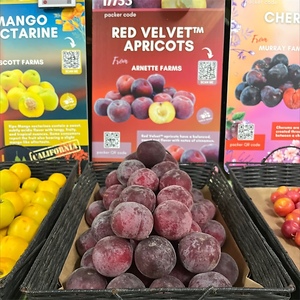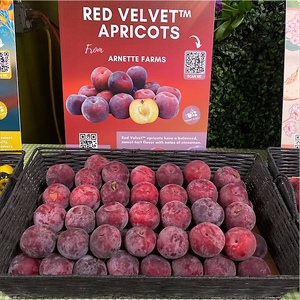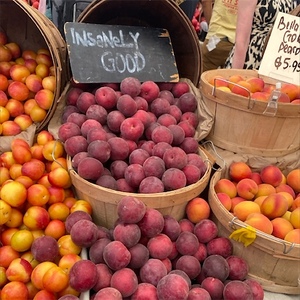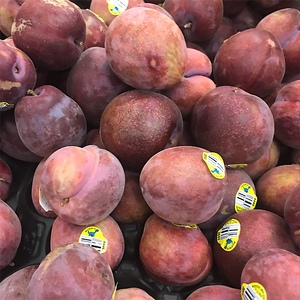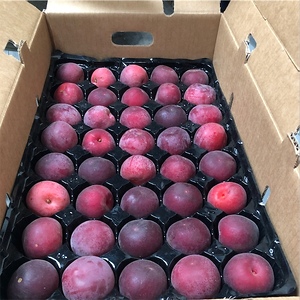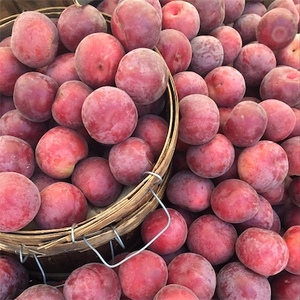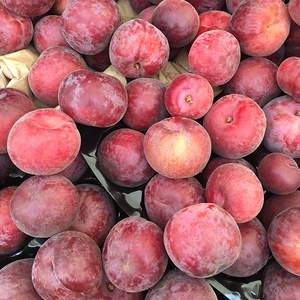

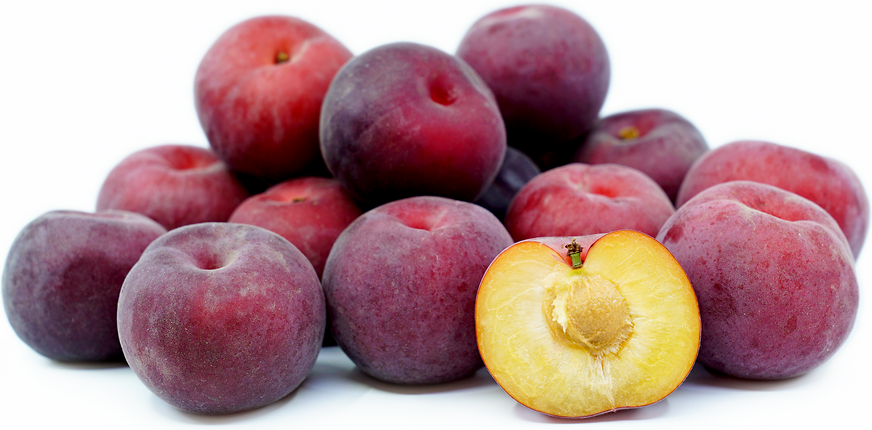
Red Velvet™ Apricots
Estimated Inventory, 1 Layer : 0
Description/Taste
Red Velvet™ apricots are a hybrid breed of apricots and plums. They measure 4 to 5 centimeters in diameter and have a similar size and purple-crimson hue to plums. Red Velvet™ apricots are covered in a fine, velvety fuzz that gives them a softer feel than plums. Their firm yet soft skin covers succulent golden-yellow flesh that’s juicier than non-hybrid apricots. The sections of flesh closer to the skin are brighter than the flesh near the core, which clings to the stone at the fruit’s center. The oval-shaped stone has a light brown hue and a hard, woody texture. It is relatively small, occupying less than half of the fruit’s content. Red Velvet™ apricots have a balanced sweet and tangy flavor with notes of cinnamon.
Seasons/Availability
Red Velvet™ apricots are typically available for a brief period from late spring to early summer.
Current Facts
Red Velvet™ apricots are part of the Prunus species and belong to the Rosaceae family. They are classified as an inter-specific hybrid because they are primarily apricot but are pollinated by plums, placing them genetically between Apriums, which are 75% apricot and 25% plum, and Plumcots, which are a 50-50 hybrid of apricots and plums. Red Velvet™ apricots possess the firmer, more transportable characteristics of apricots and the juicier texture of plums. Red Velvet™ apricots are a part of a “Velvet” series, which includes other cultivars like the Blue, Crimson, Gold, and Black Velvet™ apricots. They are primarily grown in California, where around 90% of the United States apricot production takes place. There are over 400 apricot producers in California that take up 21,000 acres across Northern California and the San Joaquin Valley. Other popular varieties that grow in the state include Blenheim, Castlebrite, Tilton, and Patterson Apricots.
Nutritional Value
Although the nutritional properties of Red Velvet™ apricots aren’t well-known, the apricot species in general contains vitamins A, C, and E. These vitamins protect against UV damage, produce collagen to prevent wrinkles and increase skin elasticity, promote good vision, prevent free radical damage, boost the immune system, and help wound healing. Apricots contain antioxidants called flavonoids that may help prevent diabetes, heart disease, cell damage, obesity, and other chronic diseases. They are a source of fiber to help maintain healthy cholesterol and blood sugar levels, nourish beneficial gut bacteria, and promote digestion. Apricots contain potassium to prevent high blood pressure and bloating, help with nerve function, encourage muscle contraction, and may potentially decrease chances of stroke. The high antioxidant levels of apricots may help prevent liver damage and decrease inflammation.
Applications
Red Velvet™ apricots are often enjoyed fresh and can be eaten whole or sliced. They can be dried, stewed, frozen, or preserved in cans, compotes, and jams. Red Velvet™ apricots can be sliced up for green salads, flatbreads, yogurt parfaits, charcuterie boards, and fruit bowls. They can be used as a topping for granola, waffles, cake, and ice cream. Red Velvet™ apricots can be baked into tarts, muffins, and pies. They can be roasted with spices like garlic, basil, nutmeg, cumin, and curry powder and served with chicken, lamb, pork, or duck. Red Velvet™ apricots can be frozen and used in smoothies or sorbets. They can be dried and eaten on their own or incorporated into trail mix. Red Velvet™ apricots can be fermented to make apricot wine or brandy. They pair well with plums, mangoes, lemons, salad greens, onions, couscous, pecans, nuts, raisins, caramel, chocolate, brown sugar, balsamic vinegar, cream cheese, goat cheese, ricotta, cottage cheese, and Creme Fraiche. Red Velvet™ apricots should be fully ripe before storing in the refrigerator, where they can be sealed to last up to two days.
Ethnic/Cultural Info
Apricots have been part of California’s agricultural landscape since the 1800s. Santa Clara County was once a flourishing farm community that boasted over 18,000 acres of apricot orchards. By the 1970s, urbanization caused by the post-war boom brought the majority of California’s apricot production from Santa Clara to the Central, Sacramento, and San Joaquin Valleys. Today, one of the leading apricot-producing towns is Patterson, California. This city was once owned by Mexico but in 1864, Abraham Lincoln granted 13,000 acres of its valuable farming land to a New York rancher named John D. Patterson. The city now hosts an annual 3-day Apricot Fiesta that includes pie-eating contests and the coronation of Little Miss and Mister Apricot.
Geography/History
Red Velvet™ apricots originated at Kingsburg Orchards in Central California after the success of their Black Velvet™ apricots. They thrive in climates with cool but not freezing winter temperatures and long, dry, warm summer seasons. Red Velvet™ apricots are a hybrid breed that cannot be found in the wild. Growers must rely on rootstock to propagate Red Velvet™ apricots since its seeds can’t reproduce new crops. The specific cultivation requirements of this breed make it more likely to be produced commercially than grown in home gardens. The rise in popularity of apricots can be attributed to Spanish explorers who brought them to California in the late 18th century. By the 1920s, California had become a major producer of apricots and farms like Kingsburg Orchards starting opening up throughout the state. Kingsburg Orchards developed Red Velvet™ apricots, along with their other Velvet™ varieties, to ensure continuous availability of these regionally popular fruits from May to early August. Because Red Velvet™ apricots aren’t widely grown outside of California and have a relatively brief window of availability, they remain a niche apricot variety. They are most likely spotted at farmer’s markets and specialty stores in California and the Pacific Northwest.
Recipe Ideas
Recipes that include Red Velvet™ Apricots. One
| Once More With Veggies |
|
Green Bean and Apricot Salad with Mint |
| Dula Notes |
|
Vegan Breakfast Fruit Cake |
Podcasts



